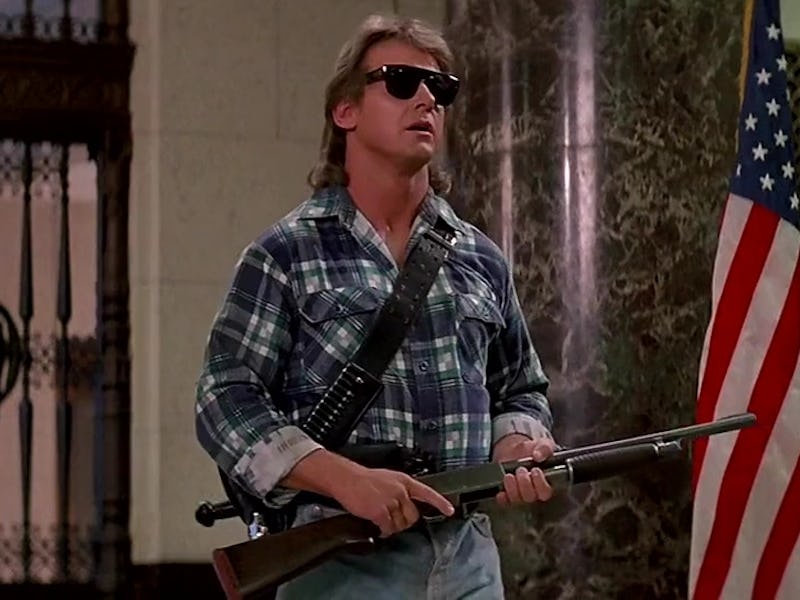Donald Trump is Bizarro Rowdy Roddy Piper In 'They Live'
How the politics of the 1988 cult classic get better, and more complicated, with age.

Early in filmmaker John Carpenter’s 1988 cult classic They Live, the two main characters, played by actor Keith David and wrestler-turned-actor Rowdy Roddy Piper, have an enlightening talk.
“So how you gonna make it?” David’s character, Frank Armitage, inquires. “I deliver a hard day’s work for my money. I just want the chance. It’ll come,” Piper’s blue-collar purposefully-named everyman John Nada laments. “I believe in America. I follow the rules. Everybody’s got their own hard times these days.”
It’s a surprisingly topical conversation considering the movie is about alien brainwashing, but Carpenter always wanted the movie to be a anti-Reagan screed wrapped in B-movie cheesiness. The movie’s political subtext has become increasingly relevant over the past two decades or more, and now, with Donald Trump as the presumptive Republican nominee, They Live has a lot to say about those who want to “Make America Great Again.”
They Live is hands-down Carpenter’s most overlty political film, and his angriest. Which says a lot coming from the guy who ended his 1982 remake of The Thing by heavily insinuating that the entire world would be destroyed because a bunch of scientists couldn’t overlook their personal squabbles. They Live was a direct response to rampant consumerism, the idea of an American police state, and the increasing economic inequality of the 1980s.
The movie stars Piper as Nada, a drifter who lives job-to-job before managing to secure a temporary construction gig in downtown LA. Similarly, David’s character has left his wife and kids behind to move to the city to find steady work. “The steel mills were laying people off left and right,” Frank says in another heart-to-heart with Nada, “They finally went under. We gave the steel companies a break when they needed it. You know what they gave themselves? Raises.”
Both men believe in the American dream, that if they work hard enough, they will eventually find success. That idealism is shattered when they find out the awful truth: the capitalist system that oppresses them is the work of corporate yuppie aliens, whose sole purpose is to brainwash the public into obedience, greed, and mindless servitude., Nad fiunsd a box of special resistance-made sunglasses that reveal the everyday aliens’ ghoulish visages in black and white; he wanders the LA streets in utter shock at the true messages that are revealed to be buried on billboards: “Obey,” “Conform,” “Consume,” “Marry and Reproduce,” “No Independent Thought.” Even money bears awful truth: “This is Your God.”
It’s a scene that author and critic Jonathan Lethem labeled in his 2010 book on the film as “10 minutes of cognitive dissonance as sublime as anything in the history of paranoid cinema.” It’s, above all, a scathing indictment of Reagan-era politics cased in a series of lovingly created b-movie effects and iconic Roddy Piper one-liners (“I have come here to chew bubblegum and kick ass, and I’m all outta bubblegum”) unlike anything seen in a studio sci-fi horror movie since. Carpenter’s horror tropes and political metaphors are so well woven into the story that it’s no wonder Starlog’s cover story about the film was titled “John Carpenter and the Invasion of the Yuppie Snatchers.”
The film was a moderate success, but not a breakout hit. Audiences most likely expected a big ’80s action movie, but it wasn’t what Carpenter had in mind. Marking the film’s 25th anniversary he told Yahoo Movies, “It’s a documentary. It’s not science fiction,” a comment even more enlightening considering the country’s current Trump-led political turmoil.
When we consider the film in the time of the Tea Party and especially Trump, an interesting juxtaposition arises. They Live becomes as contradictory as the candidate himself. Obedience, greed, and mindless servitude underlies Trump’s very career, and yet he rails against the rigged system that got him there; he is a raging populist who would have himself in the crosshairs. Trump would undoubtedly be a member of the film’s upper class milieu, who sport overly-coiffed hairdos and expensive suits, not to mention horrific bug-eyed alien faces. But he is smart enough to know how to co-opt the language of the discontented masses for his own gain, one-upping the corporate class who use sunny language to distract the masses.
Trump’s ability to stoke wild accusations could also easily align with Nada’s own patriotic paranoia, which leads to him trying to convince anyone who will listen that something is very wrong with the world. When Nada tries to get the reticent Frank to literally see what is wrong by putting on the iconic glasses, the pair engage in an elaborate fist fight. Its notoriously comical length works to illustrate Carpenter’s view about how tough it is to make people realize the the hard truths, but it could also now represent the idea that people are allowing Trump’s radical, racist, and bigoted proclamations to go on around them and do nothing about it.
“Aint none of my business, David’s character says of himself, “Ain’t none of yours,” he says to Nada.
Plenty more could be said about the film’s contemporary political implications, like Frank continuing to represent disenfranchised African Americans, lax use of firearms, or how the human sellout at the end could even be seen as Trump lackey Chris Christie. But most of all, as in They Live, the American economy continues to see the rich getting richer, the middle class shrinking, and the working class struggling to stay above water. Trump and his platform sidesteps his own participation in that with They Live-esque slogans and slick persuasion. It makes They Live even more prescient and complicated in all new ways. Like Nada said, “Brother, life’s a bitch. And she’s back in heat.”